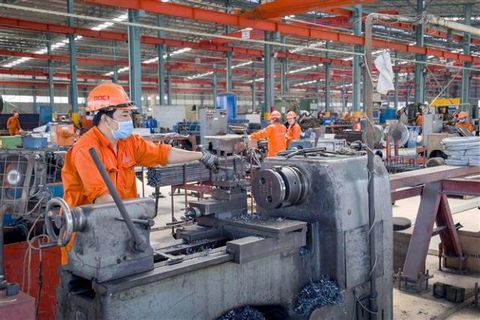
Workers in a factory at the An Hạ Industrial Park in HCM City. — VNA/VNS Photo
Domestic mechanical industries need additional support programmes in order to thrive, according to industry experts and economists.
The industries have been struggling in recent years with a shortage of orders, increased costs and decreased demand, with many businesses forced to operate at minimal capacity, according to Dao Phan Long, chairman of the Vietnam Mechanical Enterprises Association (VMEA).
Long said domestic industries have now developed decent technical capabilities in moulding, mechanical components, electrical cables, plastic and rubber. Many businesses have been making significant investments to improve production capacity and product quality to meet the high standards set by FDI enterprises, their main customers.
"To establish a strong foundation for Viet Nam's mechanical industries, businesses must be able to rely on public investment projects and the State's support programmes," Long said.
He added that a series of shortcomings and limitations in the country's policy had hindered the development of the industries.
VMEA called for additional infrastructure development and support policies to encourage businesses to invest in the production of raw materials for manufacturing industries, which have been mostly dependent on foreign imports.
Long said there should be preferential policies for businesses and investors who source from domestic firms and longer payback periods for investments in the industries.
Do Phuoc Tong, chairman of the HCM City Electrical and Mechanical Enterprises Association, a preferential tax scheme for domestic manufacturing enterprises has been long overdue. He said it doesn't do much to entice businesses to source locally for parts if they can import a whole machine at a 0 per cent tax rate.
Other inconsistencies in tax policies have contributed to Vietnamese manufacturing being unable to compete with regional peers.
For example, domestic firms have long voiced concerns over perceived "unfair treatment" compared to FDI firms searching for land and factory investment and accessing support funds.
In addition, domestic firms often find it difficult to join the supply chain due to FDI firms often prefer imported products.
"There should be policies that require a certain percentage of domestic products to promote cooperation between FDI enterprises and domestic enterprises," he said. "This will also allow supporting industries in Viet Nam to access new technologies."
National Assembly deputy Hoang Van Cuong from the National Economics University said it's critical for domestic industries to maintain a strong presence on home turf or risk missing out on a 100-million consumers market in the future. — VNS